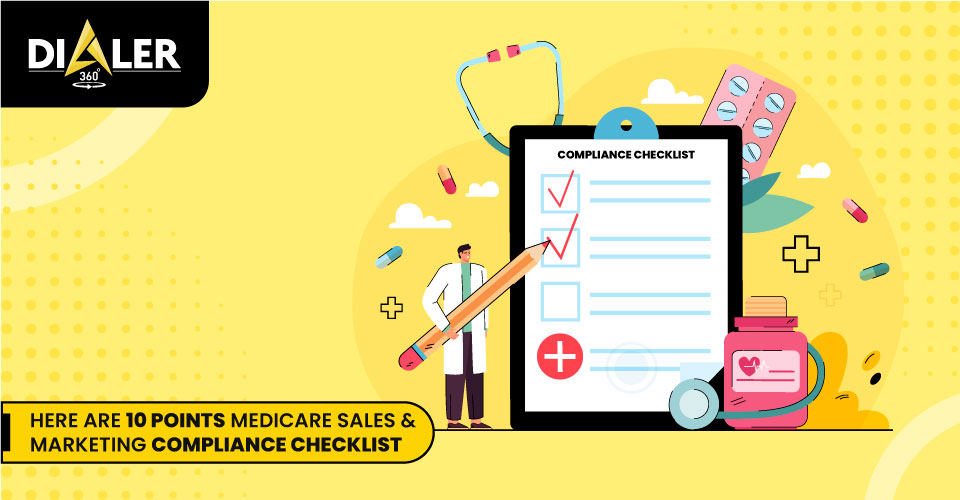The complexity of TCPA compliance and the increasingly strict CMS standards mean that maintaining compliant outreach must be top-of-mind for professionals selling Medicare and health insurance throughout the year.
Medicare can be complex, but our handy checklist has everything you need to get ready to protect your business and improve the sales process.
What are Medicare sales and Marketing
The Annual Enrollment Period is not the only time agents should be considering Medicare Compliance. Your daily business operations should put it front and foremost. You risk losing your commission,
losing your chance to sell Medicare products in the future, and possibly even leaving your members without a plan if you don’t comply. The foundation of serving your clients as an agent is earning their trust.
Regulations change every year, making compliance challenging. We are here to support you before, during, and after each sale to help you stay compliant because we are aware of the difficulties you challenge.
What is Compliance
Plans are in charge of making sure that applicable federal laws and regulations—including the marketing and communications rules of CMS—are followed.
This includes keeping an eye on and supervising the operations of their downstream entities, delegated entities, and/or subcontractors.
When rules are not followed, compliance and/or enforcement measures, such as civil money penalties and/or interim sanctions, may be taken.
Elements of a Compliance Program
Consider some elements of the compliance program:
Standards of conduct
The Contractor must have documented standards of conduct that make it apparent that they will follow all relevant laws, rules, and Medicare program requirements. All employees should receive a copy of the behavior standards in an easy-to-read format.
It should be mandatory for all staff to attest that they have read, comprehend, and agree to abide by the standards. The code of conduct may be included as an addendum to a corporate code of conduct or in a separate Medicare-specific stand-alone document.
Implementing written policies
The Compliance Officer (CO) and Compliance Committee, who oversee the execution of the compliance program, should have worked with the Contractor to produce thorough written compliance rules and procedures.
The policies and procedures may be written as Medicare supplements to corporate policies and procedures or they may be stand-alone documents with specific Medicare sales and marketing requirements.
The written compliance policies should include:
- Responsibilities of the compliance officer
- How and when staff will be trained
- Procedures for how employee reports of non-compliance will be handled
- Guidelines on how the compliance department will interact with the internal audit department
- Duties and responsibilities of management in promoting compliance among employees and responding to reports of non-compliance
- Guidelines on how the compliance department will interact with the Human Resources department
- Conducting periodic reviews, at least annually, of the code of conduct and the compliance policies and procedures
Conduct Effective Training
Conduct training programs for staff so that they understand all rules and regulations. Educate your staff on the policies, procedures as well as actions required to prevent issues in the workplace and violation of the law.
Retention of Records and Information System
According to CMS guidelines, the Contractor shall have a policy that specifies the time that Medicare documents and information will be kept on file.
Documents identified as relevant to the search or other litigation by the Office of Inspector General, the Department of Justice, or the General Counsel’s office of CMS should be kept in line with their instructions.
Compliance as an element of the performance plan
Compliance with the code of conduct, prompt reporting and appropriate resolution of compliance issues, and attendance at compliance training should all be considered by the Worker when evaluating the performance of managers and employees.
The annual performance evaluation of a manager should include criteria from the Contractor about employee promotion of the compliance program and proper handling of reports of noncompliance.
Even if the Contractor’s policy permits a manager to initially try to fix a problem, we think that all reports of non-compliance should be sent to the compliance department.
10 Points Compliance Checklist for Medicare sales and marketing
⦁ Review Modified CMS Guidelines
The Center for Medicare and Medicaid Service’s (CMS) Medicare Communications and Marketing Guidelines (MCMG) 2022 edition (CMS) is crucial reading to comprehend the most recent legally enforceable guidelines for what kinds of outreach are permitted.
⦁ Identify TCPA and Medicare Marketing risk
Analyze TCPA and marketing risk within your organization before making a compliance checklist. To assess areas of risk and exposure, audit your practice and partners including agents, vendors, and consumer outreach methods.
⦁ Compliance Risk Analysis
With so many compliance-related concerns, it is best to employ the assistance of knowledgeable counsel to regularly and periodically analyze and handle risk areas to stay up-to-date with evolving regulations.
⦁ Implement Policies
Audit and improve your internal DNC practice to ensure that all agents are up to speed. After that, implement policies to make every process reliable.
⦁ Train your staff
Best practices for compliance cannot be retained as “need to know” knowledge. Work with your QA teams to adopt and enforce changes to rules and regulations, and schedule regular meetings to update teams, including outbound sales representatives.
⦁ Manage your vendors
It’s crucial to know who you’re working with, especially in light of the new CMS regulations. CMS’s compliance control of Medicare-related sales and marketing operations is unmistakably growing.
⦁ Create consumer consent
Consumer consent should be at the center of everything you do for TCPA and CMS compliance. By providing numerous options for obtaining consent to contact, you may strengthen your compliance support. This can include incoming calls, text messaging, apps, web portals, recorded phone calls, and more.
⦁ Handle revocation of consent
Make sure you can account for reassigned phone numbers and that you can quickly (and automatically) maintain your internal do not call list.
⦁ Compliance solutions integration
To assist your team’s compliance activities, integrate outbound contact centers compliance solutions such as DNC scrubbing, dynamic scripting, and more.
⦁ Evaluate your network
As part of your routine audits, evaluate your network and familiarize yourself with the companies you’re collaborating with.
To make sure that you both adhere to the same compliance standards and that partners understand their liability requirements, review and discuss your contract terms.
Due to the higher competition, ever-changing compliance regulations, and the need to achieve sales targets managing and maintaining the compliance checklist is stressful enough.
Don’t worry the process of compliance doesn’t have to be challenging, but it does take some research and diligence on your part. Consult Dialer360 if you’re unsure!





